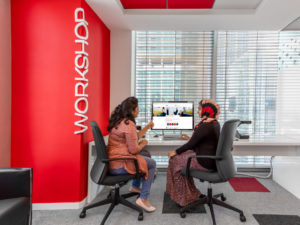In this OpEd, Samantha Rowles, Growth Operations and Enablement Director, Serco Middle East, makes the case why operators make the best ‘delivery consultants’ in a post-Covid world — Editor
When looking for impactful and efficient change, you might consider seeking out the services of a consultant to ensure you hit the goals you have set for yourself.

They will come on board, review what you would like to achieve and share with you the processes and activities that will get you there. However, therein lies a flaw–you need yet another company to come in and actually deliver it for you.
Consultants are typically a hands-off, theoretical entity that can set the stage for what you would like to achieve and potentially help you find a partner who can deliver it. Often their ideas are generic in ambition and lacking in practical application to achieve successful execution.
Brave operator
This inherently creates further problems when you eventually find an operator brave enough to stake their reputation on the delivery of these plans, often joining the process too late and subsequently, at a disadvantage.
The nature of consultancy work often over-promises as there isn’t a commitment to execute delivery and the provider, in-turn, commits to delivering a solution that may be beyond their capabilities. With so many pitfalls, it can seem daunting to achieve your vision in a way that is succinct, efficient and most importantly, cost-effective. But there is a solution: using a single provider to both consult and deliver.
Why it matters now more than ever
In the post-Covid world, clients are looking to drive cost-savings, whilst maintaining the same levels of quality and customer experience. The key here is innovation and changing the way ‘things have always been done’ whilst delivering certainty in cost savings and maintaining quality and experience.
By outsourcing to one company, a huge amount of risk and complexity is mitigated. The unification created by aligning the design of service with its delivery means that solutions are realistic, tangible and completely deliverable.
A sole provider will not set themselves up for failure, nor will they load-up their consultative piece of work with unachievable goals and promises, leading to a sub-par, disappointing end point.
The lack of a requirement to tender for a second provider further along the process strengthens this unification, as the deliverability of the solution is completely controlled in-house by one party, with no fragmentation of accountability and responsibility.
Accountability is in fact strengthened as there is no separate consultant party that can walk away at the end of their commitment, leaving the service provider to flounder during an undeliverable solution. In addition, this reduction in the number of involved parties can often result in a solution that is cheaper than the market can offer through separate parties.
Driving efficiency in digital asset management
There is no clearer example of where this can work than in the digital asset management space.

Rather than the traditional approach of using one company to procure and implement the system and another company to deliver and manage the system, a single-source approach can instead produce much more effective asset lifecycle management and asset performance results.
Moreover, the integrity of data (and the value creation) is strengthened by reducing the number of parties across the supply chain.
By using a single provider, that is technology agnostic to the different systems on the market, who can procure, implement, manage and maintain the optimum solution to meet the current and future needs, clients can expect a more progressive approach of continuous improvement.
Here maintenance is seen as an investment, and not an expense, as clients have greater transparency and accuracy on future Capex and Opex decision making in a way that truly reflects the condition of their facilities.
Companies that are already moving toward this combination of consultation and delivery are honing their go-to-market strategy by enhancing their own internal capabilities, meaning they can offer clients a larger package of services under one, cost-effective approach. Procurement becomes streamlined and implementation becomes faster allowing clients to realise benefits sooner.
Trailblazing model
Serco is leading the way by consolidating our broad capabilities into packaged solutions that can be refined to each client’s exact requirement; and continually adapting it proactively to meet ever changing market needs post-Covid.
As an example, Serco operates our ExperienceLab brand as a wrap-around to our core strategy of managing clients’ assets, people and data. This places end-user experience at the heart of everything we do. ExperienceLab conduct empirical research on the user experience of our clients’ target population.
Our consultative approach takes the findings and creates bespoke solutions to enhance user experience that is then integrated into our core service delivery of managing assets, people and data. Ultimately, we improve client experience whilst driving operational efficiencies and delivering a quality service; all achieved through partnership with Serco.
Long-term partnerships through centralizing accountability
By building this trusted relationship between client and consultant-provider, clients can save money, enhance services and set realistic, achievable goals in their strategies. Above all, the centralization of accountability means that the company enlisted to provide the service can be collaborated with as a true partner, working together with the client to manage budgets and to deliver solely on one goal with fewer roadblocks to success.
2020 has been a huge year for change and we are at the forefront of this change, hand-in-hand with our clients. If you want certainty of results, a proven track record and long-term partner; choose one provider to consult and deliver the business transformation required to find the new normal post-Covid.
(Samantha Rowles is responsible for leading growth across the region. She holds a BA Honours) in Business from Nottingham Trent University, and recently completed the MIT Sloan Digital Business Strategy program. At Serco she leads a collaborative growth programme consisting of four core workstreams; business strategy, client management services, work-winning and marketing communications.)
